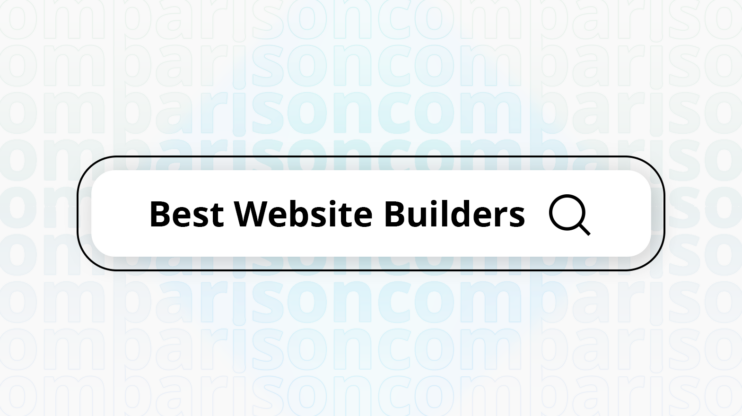Final verdict
Shopify and Weebly cater to different needs, with Shopify focusing on comprehensive ecommerce solutions and Weebly on user-friendly website creation.
-
Shopify (Overall Grade: 8.1/10)
excels as an ecommerce platform, offering a wide range of features tailored for online stores, including advanced marketing tools, robust security measures, and extensive plugins and integrations. It’s designed for businesses looking to scale, providing detailed analytics, AI capabilities, and 24/7 customer support. Shopify’s emphasis on ecommerce functionality makes it the preferred choice for users seeking a dedicated solution for online sales. -
Weebly (Overall Grade: 7.3/10)
is known for its ease of use, making it ideal for beginners and small businesses. It offers a drag-and-drop interface, mobile-friendly design, and a variety of themes. While it provides essential ecommerce features, it lacks the depth and breadth of Shopify’s offerings. However, Weebly stands out for its affordability, free plan option, and user-friendly website editor, making it a great option for those prioritizing simplicity and cost-effectiveness.

|

|
|
|---|---|---|
| Design Functionalities & Templates |
8.2 |
7.4 |
| Ease of use |
7.5 |
8.1 |
| Ecommerce |
9.2 |
7.1 |
| Website Editors |
7.9 |
7.6 |
| Product Testing Options |
8.1 |
8.3 |
| Price |
8.2 |
8.4 |
| Hosting Quality |
9.0 |
7.7 |
| Website Speed Optimization |
7.8 |
7.9 |
| Plugins and Integrations |
8.7 |
7.5 |
| Marketing Features |
8.8 |
7.1 |
| Customer Support |
8.6 |
7.3 |
| Security |
9.0 |
8.3 |
| AI Capabilities |
7.9 |
1.8 |
| User Management |
6.5 |
6.5 |
Best for ecommerce
 9.2
9.2
 7.1
7.1
Verdict
: Shopify outshines Weebly with its robust ecommerce capabilities, making it the superior choice for businesses aiming for growth and scalability.
-
Shopify
: Dominates the ecommerce space with its extensive features, including advanced inventory management, multi-channel selling, and a wide range of payment gateways. It’s designed for businesses of all sizes, focusing on growth and scalability. -
Weebly
: Offers a more straightforward approach to ecommerce, suitable for smaller stores or those just starting out. While it provides essential features like unlimited product listings and secure checkout, it lacks the depth and breadth of Shopify’s ecommerce functionalities.
Best for informational & business websites
 6.8
6.8
 7.9
7.9
Verdict
: Weebly edges out Shopify for informational and business websites, thanks to its higher score and a platform that’s more tailored to creating diverse types of websites beyond just ecommerce.
-
Shopify
: Shopify, while robust and feature-rich for ecommerce, scores a 6.8, indicating that it may not be the first choice for purely informational or business websites. Its focus on online stores means that some of its strengths, such as advanced product management and payment processing, might not be as relevant for informational sites. -
Weebly
: Scoring 7.9, Weebly is better suited for informational and business websites. Its user-friendly design, coupled with a variety of themes and the drag-and-drop interface, makes it a more versatile choice for creating a wide range of website types, including those focused on information and business content.
Detailed comparison
Design functionalities & templates
Design FunctionalitiesRepresents how well each platform allows for creative design and customization of websites.Score Components:
- Template Variety (30%): Range and quality of design templates.
- Customization (30%): Flexibility and options for design alterations.
- User Interface (20%): Ease and intuitiveness of the design process.
- Responsiveness (10%): Adaptability to different devices and screen sizes.
- Innovation (10%): Unique design features and tools.
 8.2
8.2
 7.4
7.4
🏆
Winner:
Shopify
. If you’re looking for a platform that offers a professional look with a focus on online stores, Shopify is the preferred choice.
Shopify’s templates are sleek and professional, ideal for ecommerce sites. They offer a sophisticated look with a focus on online stores. While the free template selection is not large, Shopify’s premium theme store provides a variety of industry-specific options, offering advanced features for a strong brand presence.
Shopify Themes
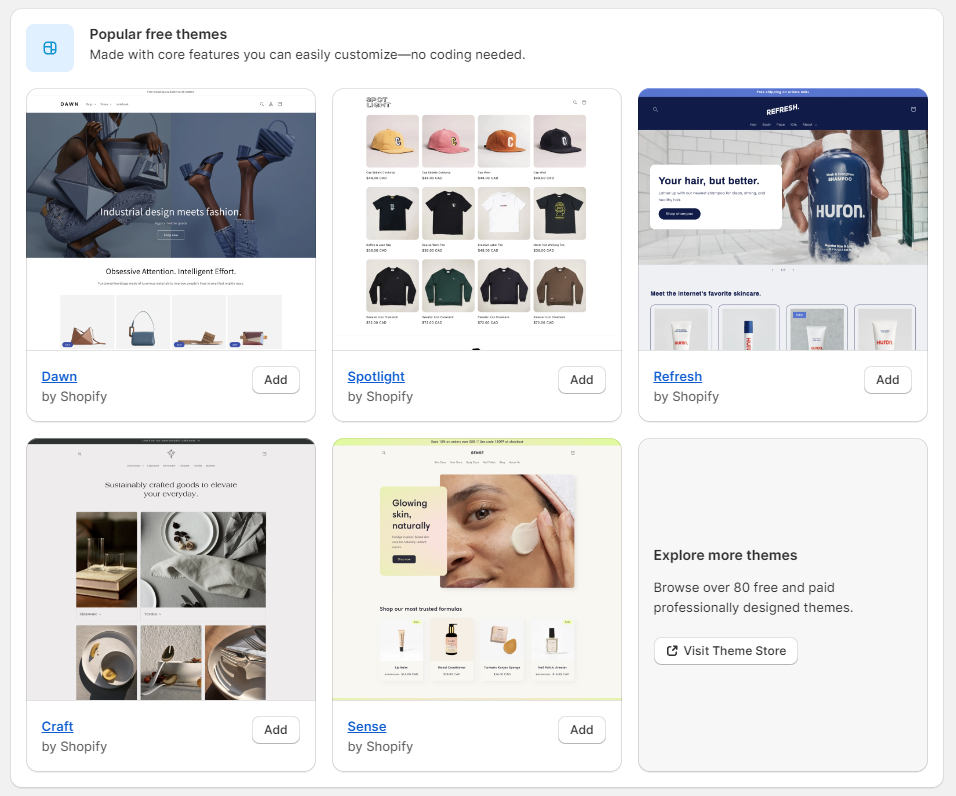
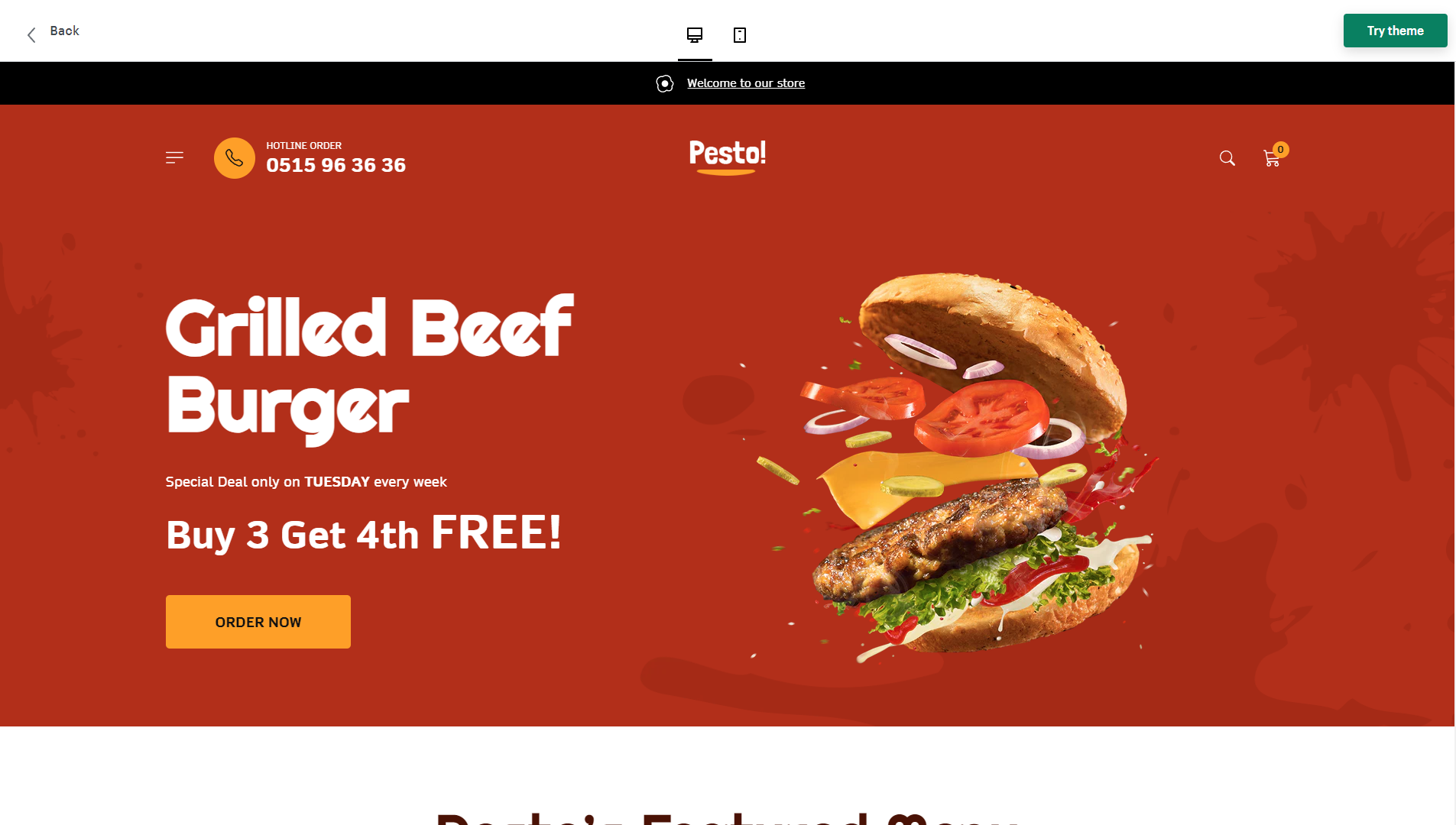
Compared to Shopify, Weebly offers a curated selection of templates, numbering in the low hundreds, which is fewer than some competitors. However, the emphasis is on high-quality, professionally designed templates covering various categories such as business, ecommerce, portfolio, blog, personal, and events. Weebly’s templates are praised for their clean, modern, and responsive design, with easy customization options for colors, fonts, layout, images, and content.
Weebly Themes


Get a head start on website creation with AI
Create a custom website tailored to your business needs 10X faster with 10Web AI Website Builder!
Ease of use
Ease of useReflects the platform’s overall user-friendliness.Score
Components:
- Learning curve (40%): Quickness and ease of getting started.
- Interface design (30%): Simplicity and intuitiveness of layout.
- User guidance (20%): Quality of tutorials and support.
- Flexibility (10%): Adaptability to various user skills.
 7.5
7.5
 8.1
8.1
🏆
Winner: Weebly
. With a score of 8.1, Weebly edges out Shopify (7.5) in terms of ease of use. Weebly’s user-friendly interface, drag-and-drop features, and mobile-friendly templates make it a great choice for beginners and experienced users alike. Shopify, while also user-friendly, has a steeper learning curve, especially for those new to ecommerce.
Learning Resources
🏆 Winner:
Shopify
. Both platforms offer extensive learning resources, but Shopify’s library of articles, tutorials, webinars, and video courses, focusing primarily on setting up and managing online stores, provides a more comprehensive learning experience for users.
For ecommerce
EcommerceMeasures the platform’s effectiveness in supporting online business activities.Score Components:
- Ecommerce themes and templates (20%): Variety and design of templates.
- Product management (25%): Ease of managing and organizing products.
- Payment options (25%): Variety and convenience of payment methods.
- Ecommerce features (20%): Features for managing an ecommerce store.
- Integration (10%): Compatibility with external e-commerce tools and services.
 9.2
9.2
 7.1
7.1

|

|
|
|---|---|---|
|
Ecommerce themes and templates |
8.2 |
6.5 |
|
Product page customization |
8.5 |
6.8 |
|
Payment processing and commissions |
8.8 |
7.0 |
|
POS capabilities |
8.1 |
6.0 |
|
Payment gateways |
9.5 |
7.5 |
|
Product numbers |
9.0 |
7.0 |
|
Additional ecommerce features |
9.1 |
6.7 |
Shopify ecommerce features:
- Comprehensive store builder
- Shopify Payments and other gateways
- Advanced inventory management
- Multi-channel selling
- Abandoned cart recovery
- Detailed analytics and reporting
Weebly ecommerce features:
- Unlimited products
- Inventory management
- Product reviews and ratings (Paid plans)
- Secure checkout
- Shipping options
- Abandoned cart recovery (Paid plans)
- Basic analytics
- SEO tools
- Marketing integrations (Paid plans)

Ecommerce themes & templates
Shopify offers about 150 modern responsive themes for creating a virtual storefront, ensuring a good look on both desktop and mobile devices. While some themes are free, others cost between $170 to $380. In contrast, Weebly provides ecommerce-specific themes with a decent range of styles, offering built-in features like product galleries and optimized checkout flows. While customization options include adjustments to colors and fonts, limitations exist compared to dedicated platforms, with a smaller theme selection and less design flexibility, potentially requiring additional costs for premium themes with advanced features.
Product page customization
Shopify has a limit of three options per product, totaling 100 unique variations. This limit may not pose a significant constraint, and it is suggested that for products with numerous options, creating separate listings on Shopify can be a more manageable approach. While Shopify offers titles, descriptions, and image galleries with zoom effects, customization options like adding ribbons, size charts, and wishlists are not as straightforward. However, Shopify distinguishes itself with additional features through its extensive library of extra apps, offering functionalities like reviews, Facebook stores, eBay item importers, and a unique Augmented Reality feature for an enhanced customer experience.
On the other hand, Weebly allows a decent level of product page customization through its user-friendly interface, offering options for layout, colors, fonts, backgrounds, and content. While not as extensive as dedicated ecommerce platforms, it enables personalized and visually appealing product pages. Advanced customization, including custom CSS and app integrations, is available with paid plans, but limitations exist in design flexibility compared to dedicated platforms.
Get a head start on website creation with AI
Create a custom website tailored to your business needs 10X faster with 10Web AI Website Builder!
Payment processing
When it comes to payment processing, Shopify offers payments with typical charges of
2.9% + 30¢
per online transaction on basic plans, and lower fees for higher-tier plans. However, it adds extra fees for using other payment gateways. Shopify Payments is Shopify’s own payment processing gateway. It allows merchants to accept credit card payments directly on their store without having to integrate third-party payment providers. This simplifies the payment process, reduces transaction fees, and streamlines the handling of finances.
Weebly seamlessly integrates with popular payment processors such as Square, Stripe, PayPal, and others, enabling secure and convenient online transactions for your store. Users can choose their preferred gateway, set up payment processing within Weebly’s settings, and benefit from features like secure checkout and, on paid plans, options for recurring payments and international transactions.
Website Editors
Website EditorsEvaluates the platforms’ website building and editing capabilities.Score Components:
- Customization tools (40%): Range and power of editing features.
- Editor usability (30%): User experience within the editor.
- Design flexibility (20%): Freedom in layout and design changes.
- Update and maintenance ease (10%): Simplicity of updating and maintaining the site.
 7.9
7.9
 7.6
7.6
🏆
Winner:
Shopify
. Shopify, with a score of 7.9, excels in providing a streamlined, ecommerce-focused editing experience. It’s particularly beneficial for users who prioritize efficient management of online stores. The editor is straightforward, making it easy to add products, manage inventory, and set up payment methods. Shopify’s editor is optimized for sales and business growth, with built-in tools specifically designed for ecommerce businesses.
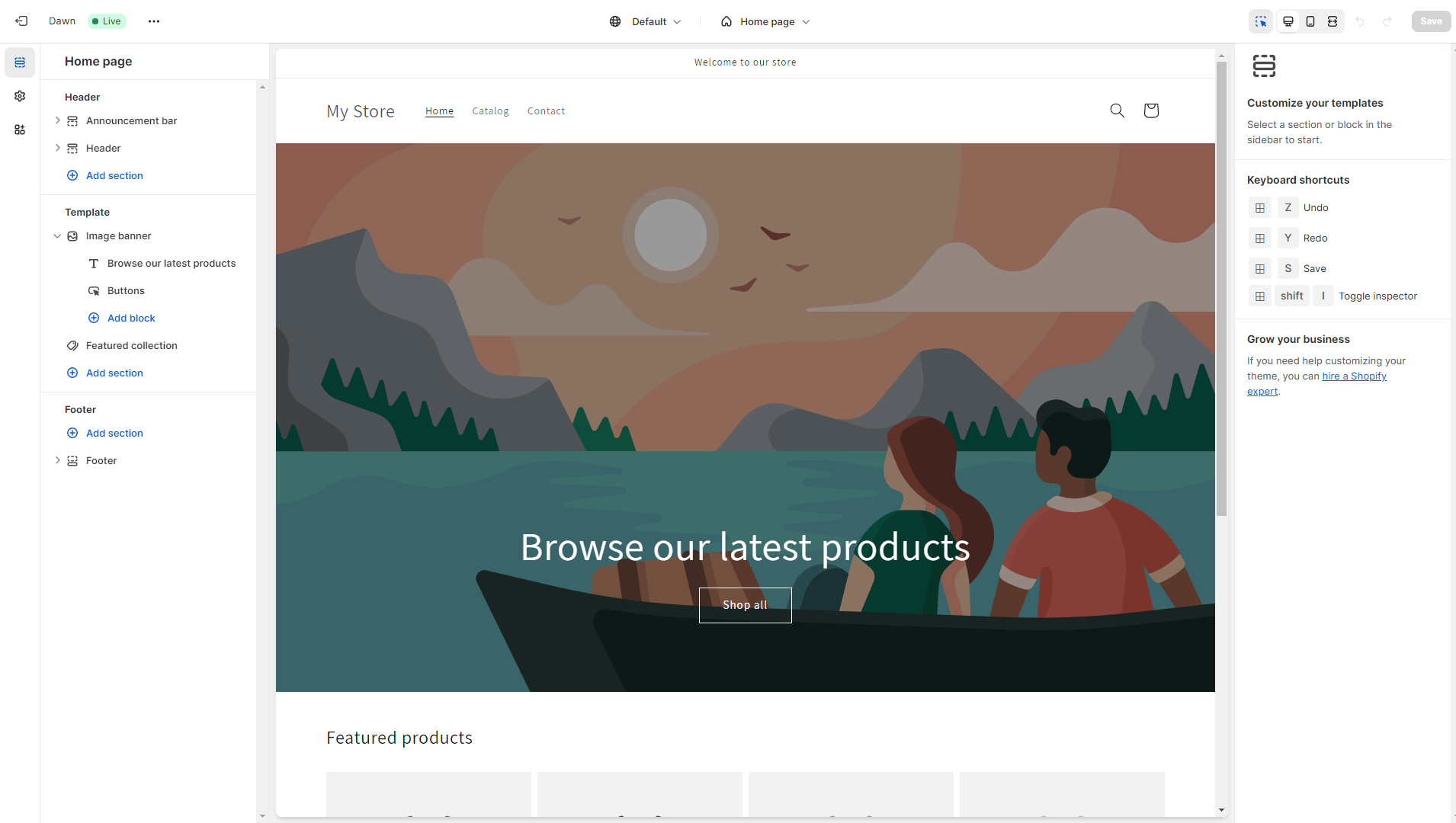
Weebly’s editor, scoring 7.6, stands out for its drag-and-drop simplicity, catering to beginners with an intuitive interface and visual editing. The editor features a range of pre-designed templates, customization options, and content management tools, making it accessible for users without coding knowledge. While offering ease of use, it has some limitations in design flexibility and advanced features, with certain functionalities requiring a move to paid plans.

Mobile editor/app
 8.0
8.0
 8.1
8.1
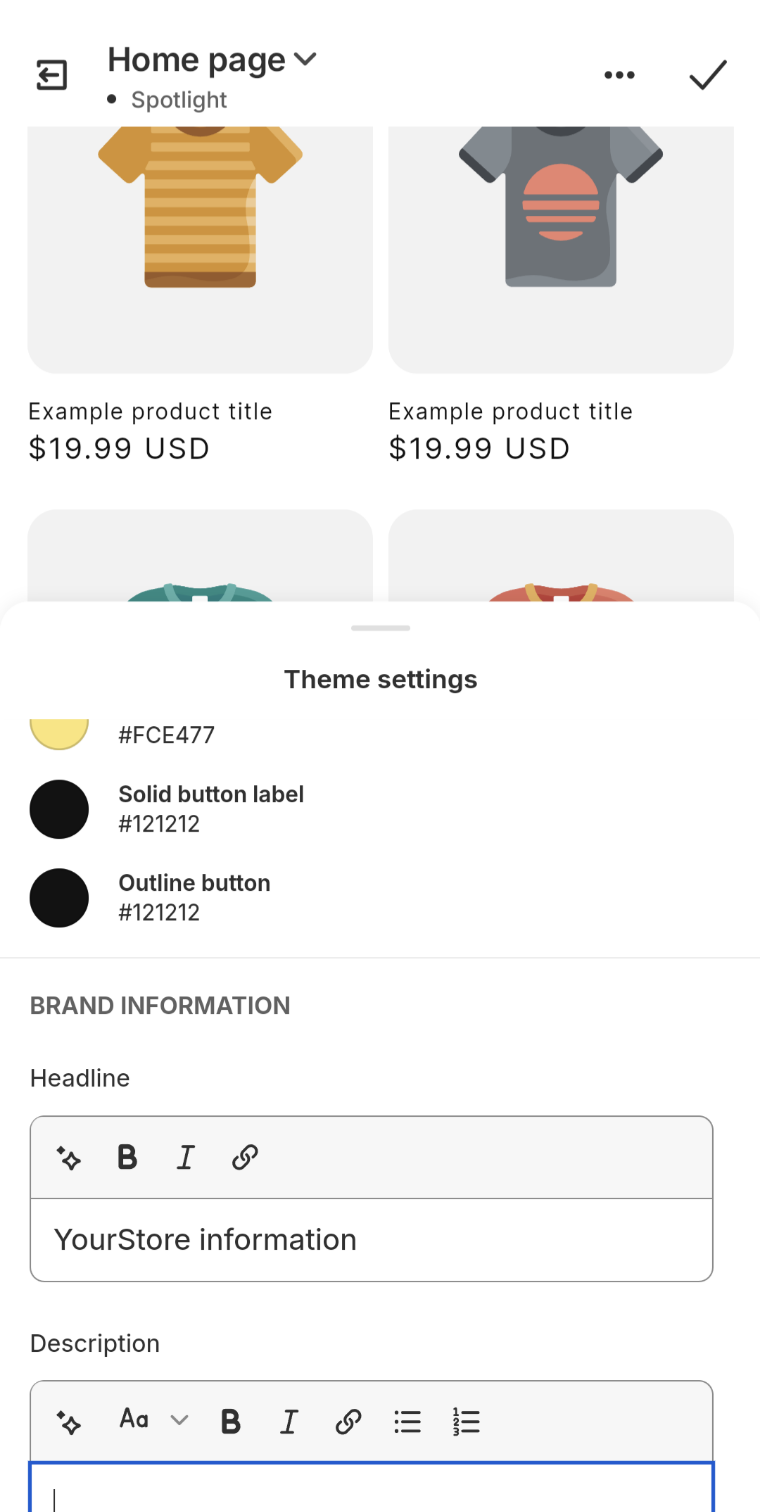

🏆
Winner:
Weebly
. Both Shopify and Weebly offer mobile apps for managing your website, but they cater to different needs and skill levels. Shopify’s mobile app is more ecommerce-focused, allowing users to manage their online stores efficiently. It offers features for product management, order processing, inventory tracking, and sales reporting. However, it may be overwhelming for beginners due to its emphasis on ecommerce features.
Weebly’s mobile app, on the other hand, is more suited for basic edits and content management. It allows users to make quick content updates and basic design customizations. However, it has limitations in advanced editing capabilities and extensive design flexibility, making it best suited for quick content updates rather than major design changes.
In summary, Weebly receives a slightly higher rating due to its user-friendly interface and basic editing capabilities, while Shopify is strong in ecommerce management but may be better suited for users with some experience.
Product testing options
Product Testing OptionsAssesses the options for trying out platform features before commitment.Score Components:
- Trial quality (40%): Extent and usefulness of the trial or free version.
- Feature accessibility (30%): How many features are available to test.
- Trial duration (20%): Length of the trial period.
- Ease of transition (10%): Smoothness of moving from trial to paid plans.
 8.1
8.1
 8.3
8.3
Overall Result
:
Weebly Wins
. Weebly scores slightly higher than Shopify in product testing options with a score of 8.3 compared to Shopify’s 8.1. While Shopify offers a 14-day free trial with access to all features, Weebly provides a free version and a 30-day money-back guarantee, allowing users to explore all the features of any paid plan and make a decision within the refund window.

|

|
|
|---|---|---|
|
Free Plan |
No (14-day free trial) |
Yes |
|
Trial Duration |
14 days |
No, but 30-day money-back guarantee |
|
Testing Premium Features |
All features during free trial |
Yes, within 30-day refund window |
Price
Design FunctionalitiesRepresents how well each platform allows for creative design and customization of websites.Score Components:
- Template Variety (30%): Range and quality of design templates.
- Customization (30%): Flexibility and options for design alterations.
- User Interface (20%): Ease and intuitiveness of the design process.
- Responsiveness (10%): Adaptability to different devices and screen sizes.
- Innovation (10%): Unique design features and tools.
 8.2
8.2
 8.4
8.4
Shopify and Weebly both offer a range of price plans, but Shopify’s plans are more feature-rich, especially for ecommerce. Shopify also offers enterprise plans for high-growth businesses and large enterprises, while Weebly does not have a distinct enterprise plan.

|

|
|
|---|---|---|
|
Free |
No offering at this amount. |
Free ($0/month): Basic template selection, 500MB storage, Weebly ads, limited features. |
|
$0-$10 |
No offering at this amount. |
Personal ($6/month): Custom domain, unlimited storage, ad-free, limited SEO and email marketing tools. Value for price: 6.0 |
|
$10-$20 |
No offering at this amount. |
Professional ($12/month): Advanced design options, blog membership features, advanced SEO tools, form analytics. Value for price: 7.5 |
|
$20-$30 |
Shopify Basic ($29/month): Unlimited products, 2.9% + 30¢ card fee with Shopify payments, Extra 2% gateway fee without Shopify Payments, Abandoned cart recovery, Automated sales tax, Digital products, POS Integration, 2 staff accounts. Value for price: 8.0 |
Performance ($26/month): Advanced ecommerce features, lead capture tools, custom code injection, marketing automation. Value for price: 9.0 |
|
$70-$80 |
Shopify Standard ($79/month): Lower card fees (2.6% + 30¢), Gift cards, Professional reports, 5 staff accounts. Value for price: 8.5 |
No offering at this amount. |
|
$200+ |
Advanced Shopify ($299/month): Lowest card fees (2.49% + 30¢), Advanced report builder, Real-time carrier shipping, Up to 15 staff accounts Value for price: 8.8 |
No offering at this amount. |
Hosting quality
Design FunctionalitiesRepresents how well each platform allows for creative design and customization of websites.Score Components:
- Template Variety (30%): Range and quality of design templates.
- Customization (30%): Flexibility and options for design alterations.
- User Interface (20%): Ease and intuitiveness of the design process.
- Responsiveness (10%): Adaptability to different devices and screen sizes.
- Innovation (10%): Unique design features and tools.
 9.0
9.0
 7.7
7.7
🏆
Winner: Shopify
. Shopify’s proprietary cloud-based hosting, with a 99.99% uptime guarantee and 5 global data centers, is designed for high-traffic online stores. Weebly, on the other hand, offers shared, cloud-based, and managed hosting with a 99.9% uptime guarantee. However, Weebly has been critiqued for slow page loading times and does not disclose the specific locations of their data centers.

|

|
|
|---|---|---|
|
Do they offer hosting? |
Yes, included in all paid plans |
Yes, included in all paid plans |
|
Data Centers: |
5 globally: USA (Ashburn, Virginia; Santa Clara, California), Canada (Toronto, Ontario), Ireland (Dublin), and Singapore |
Weebly leverages a global network of data centers to deliver reliable and efficient website hosting. However, they do not publicly disclose, the specific locations of their data centers due to security and technical reasons. |
|
Type of hosting: |
Proprietary cloud-based hosting |
Shared Hosting, Cloud Based Hosting, Managed Hosting |
|
Uptime: |
99.99% |
99.9% |
|
Uptime Guarantee: |
Yes, 99.99% |
Yes, 99.95% |
Website Speed Optimization
Design FunctionalitiesRepresents how well each platform allows for creative design and customization of websites.Score Components:
- Template Variety (30%): Range and quality of design templates.
- Customization (30%): Flexibility and options for design alterations.
- User Interface (20%): Ease and intuitiveness of the design process.
- Responsiveness (10%): Adaptability to different devices and screen sizes.
- Innovation (10%): Unique design features and tools.
 7.8
7.8
 7.9
7.9
🏆 Winner: Weebly
Both Shopify and Weebly prioritize website performance and page speed, with Shopify focusing on app efficiency and theme optimization, and Weebly emphasizing load balancing and CDN. However, Weebly slightly outperforms Shopify in terms of website speed optimization.

|

|
|
|---|---|---|
|
Focus |
App efficiency, Theme optimization |
Load balancing, CDN |
|
Performance Tools |
Google Lighthouse, PageSpeed Insights |
Google PageSpeed Insights Integration |
|
Key Strategies |
App efficiency, Theme optimization |
Load balancing, CDN |
|
Load Times |
Varies widely, dependent on optimization |
2s to 4s |
|
Page Speed Scores Range |
Scores vary; influenced by apps, images |
Average 80+/100 |
|
Core Web Vitals Improvement |
Emphasis on LCP, FID, CLS improvements |
Enhanced CWV performance with various measures |
Shopify places a strong emphasis on website performance and page speed. Its approach to enhancing site speed includes app optimization by removing unneeded app code, conditionally loading apps, avoiding immediate pop-up displays, and incorporating app functionality directly into themes. Shopify also suggests utilizing Google AMP for faster mobile page loads, although with some design compromises. Analysis of Shopify sites showed a range of Shopify speed scores, influenced by apps and images, and load times varying widely, dependent on optimization.
On the other hand, Weebly has significantly enhanced its Core Web Vitals performance by implementing measures such as automatic image optimization, lazy loading for content, code minification, and caching. These improvements, along with streamlined JavaScript usage and an enhanced server infrastructure, aim to boost website loading speed and responsiveness. Real-world performance analysis of Weebly websites showed load times ranging from 2s to 4s and an average PageSpeed score of 80+/100.
Get a head start on website creation with AI
Create a custom website tailored to your business needs 10X faster with 10Web AI Website Builder!
Plugins and integrations
Design FunctionalitiesRepresents how well each platform allows for creative design and customization of websites.Score Components:
- Template Variety (30%): Range and quality of design templates.
- Customization (30%): Flexibility and options for design alterations.
- User Interface (20%): Ease and intuitiveness of the design process.
- Responsiveness (10%): Adaptability to different devices and screen sizes.
- Innovation (10%): Unique design features and tools.
 8.7
8.7
 7.5
7.5
🏆 Winner:
Shopify.
With a score of 8.7, Shopify outperforms Weebly, which scores 7.5. Shopify offers over 8,000 apps in its
App Store
, covering a wide range of functionalities. These apps come with various pricing options, including free, paid, freemium, and one-time payment models. Key Shopify integrations feature Oberlo for dropshipping, Klaviyo for email marketing, Yotpo for reviews, Printful for print-on-demand, Shopify POS for sales, Google Analytics for insights, Facebook Channel for social selling, ShipStation for shipping, QuickBooks for accounting, Privy for conversions, Smile.io for loyalty, SEO Manager, AfterShip for tracking, Spocket for products, and Gorgias for customer service, enhancing various ecommerce aspects.
On the other hand, Weebly offers ways to enhance your website’s capabilities through the
Weebly App Center
, and advanced users can inject custom code for specific features. Moreover, higher-tier plans provide API access, allowing developers to connect websites with external services for added functionality. Popular options across categories include Mailchimp and Constant Contact for marketing, Google Analytics and Hotjar for analytics, and Stripe and PayPal for ecommerce. Acuity Scheduling and Formstack are valuable for functionality, while Recaptcha and BackupBuddy enhance security. Productivity is boosted with Slack and Zoom Meetings integrations, and visual appeal is achieved with Instagram Feed and Unsplash. However, the overall range and depth of Shopify’s plugins and integrations give it the upper hand.
Shopify Applications
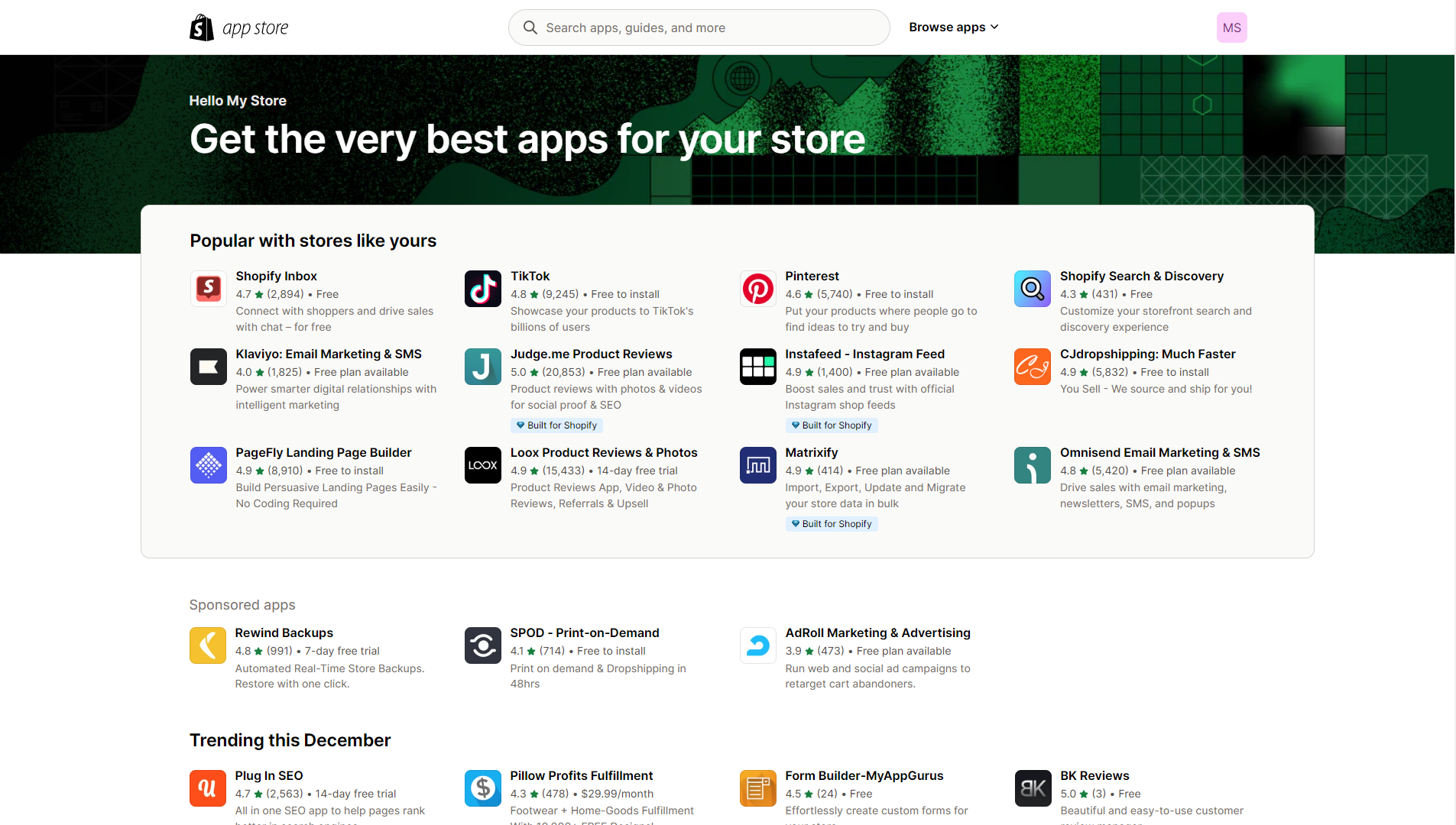
Weebly Applications

Marketing Features
Design FunctionalitiesRepresents how well each platform allows for creative design and customization of websites.Score Components:
- Template Variety (30%): Range and quality of design templates.
- Customization (30%): Flexibility and options for design alterations.
- User Interface (20%): Ease and intuitiveness of the design process.
- Responsiveness (10%): Adaptability to different devices and screen sizes.
- Innovation (10%): Unique design features and tools.
 8.8
8.8
 7.1
7.1
Overall Winner: Shopify
. Shopify stands out for its more advanced ecommerce-focused marketing tools, especially in analytics and ad campaign management. Weebly, while offering a robust set of marketing tools, falls short in comparison, especially in the area of email marketing and analytics.

|

|
|
|---|---|---|
|
SEO Tools |
|
|
|
Email Marketing |
|
Integration with third-party platforms |
|
Blogging |
|
|
|
Social Media Integration |
Advanced integration for selling directly on social platforms |
Easy link to social media accounts and share buttons |
|
Analytics and Reporting |
Detailed analytics for in-depth insights |
Basic analytics for tracking site performance |
|
Ads and Promotions |
Google Ads integration; sophisticated ad campaign management |
Integrated marketing tools for creating and managing ads |
Customer Support
Design FunctionalitiesRepresents how well each platform allows for creative design and customization of websites.Score Components:
- Template Variety (30%): Range and quality of design templates.
- Customization (30%): Flexibility and options for design alterations.
- User Interface (20%): Ease and intuitiveness of the design process.
- Responsiveness (10%): Adaptability to different devices and screen sizes.
- Innovation (10%): Unique design features and tools.
 8.6
8.6
 7.3
7.3
🏆 Winner:
Shopify
. Shopify outperforms Weebly in this category with a customer support score of 8.6 compared to Weebly’s 7.3. Shopify provides 24/7 support through chat, email, and phone, and it offers a dedicated program and additional resources for enterprise-level businesses.
Weebly, on the other hand, offers a variety of support options, including an Online Help Center, a Community Forum, and Email Support. Live Chat is available during limited hours, and Phone Support is offered to Pro and Business plan users in the US and Canada during specific hours. Weebly also provides a dedicated account manager, priority phone support, and enhanced onboarding and training resources for Business plan users. However, these features were not enough to surpass Shopify’s comprehensive and round-the-clock customer support.
Security
Design FunctionalitiesRepresents how well each platform allows for creative design and customization of websites.Score Components:
- Template Variety (30%): Range and quality of design templates.
- Customization (30%): Flexibility and options for design alterations.
- User Interface (20%): Ease and intuitiveness of the design process.
- Responsiveness (10%): Adaptability to different devices and screen sizes.
- Innovation (10%): Unique design features and tools.
 9.0
9.0
 8.3
8.3
🏆
Winner:
Shopify
. Shopify’s security measures are robust and comprehensive, ensuring the safety of both user data and website security. They prioritize data privacy and security through secure infrastructure, encryption, and limited access. Shopify also complies with data privacy regulations, practices data minimization, and ensures user control and transparency. Additional security measures include two-factor authentication, regular audits, and a dedicated incident response team.
Although it may not offer the same level of specialized ecommerce security features as Shopify, Weebly also prioritizes the privacy and security of user data through various measures. They employ encryption, access controls, and regular backups, while users benefit from strong password security, two-factor authentication, and the ability to manage their personal data. Weebly also places a strong emphasis on safeguarding its platform and user websites, employing secure data centers, routine system updates, and encryption through SSL certificates.
AI Capabilities
Design FunctionalitiesRepresents how well each platform allows for creative design and customization of websites.Score Components:
- Template Variety (30%): Range and quality of design templates.
- Customization (30%): Flexibility and options for design alterations.
- User Interface (20%): Ease and intuitiveness of the design process.
- Responsiveness (10%): Adaptability to different devices and screen sizes.
- Innovation (10%): Unique design features and tools.
 7.9
7.9
 1.8
1.8

|

|
|
|---|---|---|
|
AI Builder |
Shopify AI Builder offers functionalities like theme section builder, content generation, SEO optimization, and email marketing tools. |
Weebly does not currently offer a dedicated AI builder feature. |
|
AI Ecommerce Features |
Shopify pioneers AI-driven eCommerce with personalized recommendations, dynamic search, and automated marketing. |
Weebly doesn’t offer any built-in AI-powered features specifically for ecommerce within its platform. |
|
AI Content Generation |
Shopify’s AI features Content Assistant which helps to brainstorm ideas, overcome writer’s block, and generate outlines for product descriptions, blog posts, social media captions, and more. |
Weebly itself lacks native AI content generation features. However, you can utilize third-party tools like Jasper, Copy.ai, and ShortlyAI for AI-powered content creation. |
|
Additional AI Features |
Shopify offers additional AI features like demand forecasting, automated replenishment, smart fraud detection, chargeback management, AI-powered chatbots, sentiment analysis, route optimization, and warehousing optimization. |
While Weebly does not have native AI capabilities, it is possible to integrate third-party AI-powered plugins, such as Copy.ai and Jasper. |
🏆 Winner:
Shopify
. Shopify, with a score of 7.9, utilizes AI mainly to enhance the ecommerce experience. Its AI features focus on customer behavior analysis, personalized shopping experiences, inventory management, and sales predictions. While Shopify’s AI is powerful, it is more business and data-centric compared to Weebly’s design-focused AI.
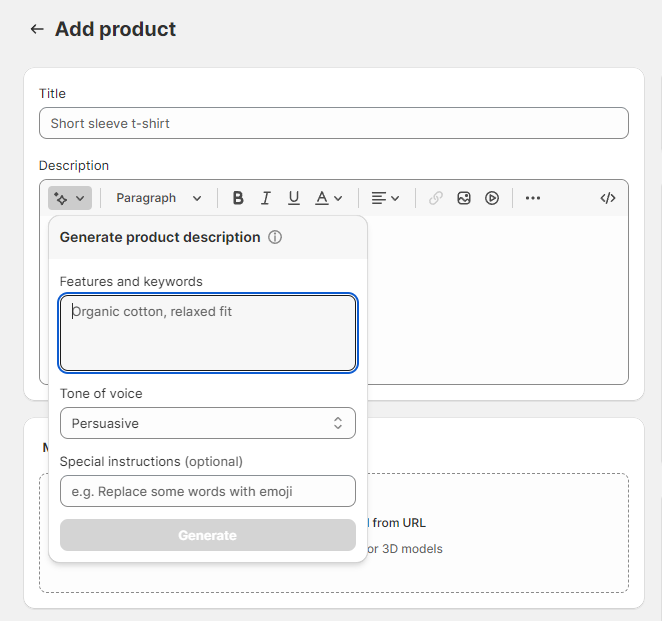
Weebly, with a score of 1.8, does not have a dedicated AI builder or native AI ecommerce features. However, it allows the integration of third-party AI-powered tools for content creation. This makes Weebly’s AI capabilities limited compared to Shopify.
User Management
Design FunctionalitiesRepresents how well each platform allows for creative design and customization of websites.Score Components:
- Template Variety (30%): Range and quality of design templates.
- Customization (30%): Flexibility and options for design alterations.
- User Interface (20%): Ease and intuitiveness of the design process.
- Responsiveness (10%): Adaptability to different devices and screen sizes.
- Innovation (10%): Unique design features and tools.
 6.5
6.5
 6.5
6.5
🏆 Winner:
Tie
. Both Shopify and Weebly have their unique approaches to user management.
-
Shopify enforces staff account limits based on plans, ranging from 2 to 15, with Shopify Plus offering unlimited
accounts. Collaborators with limited access are also an option. - The number of users permitted to edit a Weebly website varies depending on the plan selected. The Free Plan allows only one user, suitable for personal or simple projects, while the Personal Plan accommodates two users, making it appropriate for small businesses or collaborative efforts. The Professional Plan permits up to 10 users, catering to growing businesses or teams with specific roles, and the Business Plan offers unlimited user access.
Shopify User Roles and Access Levels:
| Role | Description | Access Highlights |
|---|---|---|
| Store Owner | Full control over store | Manage products, orders, discounts, payments, apps, settings. Create and manage staff accounts. |
| Staff | Configurable access by owner |
Add/edit products, manage orders, fulfill orders, manage customers, update content. Access level can be customized by the owner. |
| Collaborator | Limited access for external partners | View and manage specific sections like blog or product categories. Cannot access full store settings. |
Weebly User Roles and Access Levels:
| Role | Description | Access Highlights |
|---|---|---|
| Owner | The primary account holder and creator of the Weebly site. | Full access to all site features, including design, pages, settings, store management, and analytics. |
| Admin | Users granted significant control over the site by the Owner. | Can edit and publish site content, manage store orders, view analytics, and access most site settings, except for site ownership transfer and account deletion. |
| Author | Users with limited permissions, typically focused on content creation. | Can create and edit blog posts, manage comments, and sometimes edit specific pages if granted permission. |
| Store Manager | Specifically focused on e-commerce aspects of the site. | Access to manage and fulfill orders, view store analytics, and edit product details, but cannot change site design or settings. |
Additional Features

|

|
|
|---|---|---|
|
SSL Certificate |
|
|
|
Custom Domain |
|
|
|
Free Custom Domain Included |
|
|
|
International Domains |
|
|
|
Mobile Responsive |
|
|
|
Page Speed |
|
|
|
Website Builder Mobile App |
|
|
|
Convert a Website To An App |
|
|
|
Website Analytics |
|
|
|
Multilingual Sites |
|
|
|
Multiple Users |
|
|
User Feedback
Shopify’s slightly higher rating on G2 Crowd can be largely attributed to its specialization in ecommerce. Its comprehensive features, ease of use, and robust customer support cater specifically to online businesses, leading to high user satisfaction among those seeking a dedicated ecommerce solution.
Square Online (formerly Weebly) receives positive reviews for its user-friendly drag-and-drop interface and quick website development features, making it suitable for small businesses. Users highlight its role in efficient appointment booking, saving time in coordination and scheduling. However, some express a desire for more advanced building tools and better pricing. The platform is recognized for streamlining website and payment operations, though opinions on customer service and design limitations are mixed. Overall, it is considered a good, affordable solution for small businesses.
The making of this blog
We followed a clear, step-by-step process to write and research this article.
FAQ
Which platform is better for ecommerce, Shopify or Weebly?
Can I build an informational or business website with Shopify or Weebly?
How do Shopify and Weebly compare in terms of ease of use?
Which platform offers better customer support, Shopify or Weebly?
Are Shopify and Weebly secure platforms for building a website?
Which platform is more affordable, Shopify or Weebly?
Can I use AI features on Shopify and Weebly?









